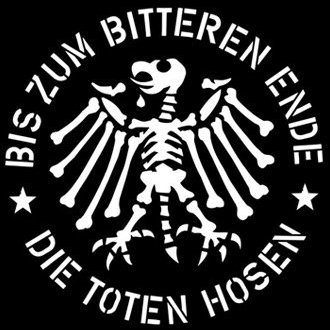The Formative Years - Die Toten Hosen
 When it comes to the true nature of what could be defined as a “formative” influence when it comes to punk rock during the onset of my adolescence, there are only two gateway Teutonic bands that can also be found on pretty much any pre-millennials’ list who was socialized with punk rock in Germany during the early 1990s. One of those two is Die Toten Hosen.
When it comes to the true nature of what could be defined as a “formative” influence when it comes to punk rock during the onset of my adolescence, there are only two gateway Teutonic bands that can also be found on pretty much any pre-millennials’ list who was socialized with punk rock in Germany during the early 1990s. One of those two is Die Toten Hosen.
It was in my pre-teenage years that I made the acquaintance of a Yugoslavian gentleman almost twice my age, who moved to my neighborhood. He looked intimidating in every way, had tattoos, had his own gang, a car and despite his rough antics in public arenas, proved to be a chill and gentle giant during his downtime, which saw him tuning his car and me hanging out. It was through him that I was first introduced to punk rock and more extreme music. One of the bands he played for me in his garage were Die Toten Hosen and their “Opel Gang” album in honour of his vehicle.
Formed in the context of Düsseldorf’s alternative hangout Ratinger Hof and spawned in 1982 out of the ashes of local fun punk band ZK, my first introduction to the band was through their now classic “Unter falscher Flagge” album, the Schunkelpunk of which resonated instantaneously, which is not further wondrous because of the straight forward approach both in terms of Schlager-like palatable compositions and nonsensical lyrical matter revolving around drinking and the relatable shenanigans of juvenile delinquents.
The 120 minutes long tape my friend recorded for me contained their first four albums, including their first live album “Bis zum bitteren Ende”, the unbridled furious nature of which spawned the desire to see them in the third dimension.
1988 saw them release what should catapult Die Toten Hosen into mainstream terrain, i.e., their “Ein kleines bisschen Horrorshow” album, the tracks of which were all referencing Anthony Burgess’ “A clockwork orange”, which I bought immediately in book form after learning about it, to then venture on to get Stanley Kubrick’s movie version.
1989 offered the opportunity to see DTH perform in my hometown, which proved to be a pivotal experience as their antics on- and offstage resulted in them specifically and punk bands in general being band from playing at that venue for two decades. It was fantastic and exactly as wild and debaucherous as I had hoped for.
Having entered mainstream territory, the band continued to release albums with their ethos still firmly based on punk rock, yet I had moved on to more extreme forms of music and a scene that considered them as sellouts as they started to appear more and more on TV shows and became part of the established cultural canon.
It was not until many years later after I had moved to another continent that I felt the urge to reconnect with German music and revisited their catalogue. I found quite some gems with their albums released after 1990, some of which have become favourites with DTH fusing their original style with power chords and infusing it with influences from fringe areas of the punk, rock, and metal spectrum.
The focus of the band's music has gradually shifted from funny and nonsensical to the more serious and politically ambitious. The songs from the band's first LP were mostly about having fun, but by the end of the 1980s they were focusing more on social issues.
As one grows older, it proves to be more difficult to find lasting constants that one has a relation to and that can be revisited with reliability. DTH remains one of them.